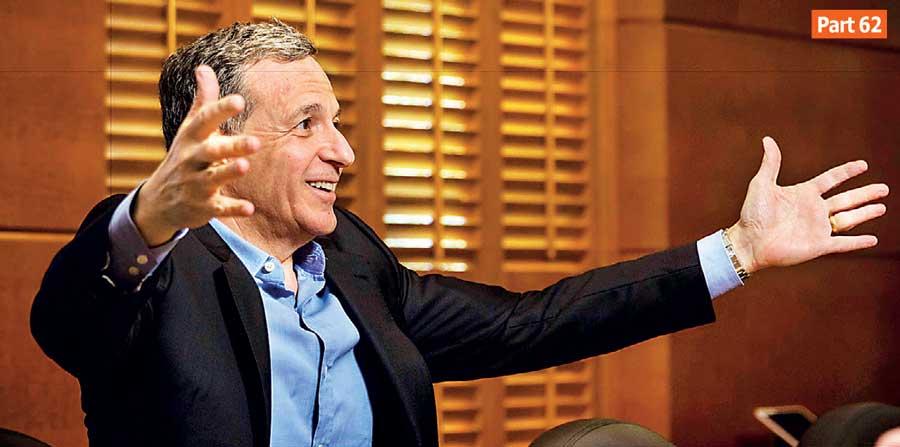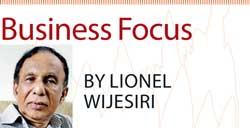23 Dec 2019 - {{hitsCtrl.values.hits}}

 Robert Allen Iger (born February 10, 1951) is an American film producer, author and businessman, who is Chairman and Chief Executive Officer (CEO) of The Walt Disney Company. Before working for Disney, he served as President of ABC Television during 1994–95 and as President/COO of Capital Cities, Inc. from 1995, until Disney’s acquisition of the company in 1996.
Robert Allen Iger (born February 10, 1951) is an American film producer, author and businessman, who is Chairman and Chief Executive Officer (CEO) of The Walt Disney Company. Before working for Disney, he served as President of ABC Television during 1994–95 and as President/COO of Capital Cities, Inc. from 1995, until Disney’s acquisition of the company in 1996.
Iger was a driving force behind the reinvigoration of Walt Disney Animation Studios and the branded-release strategy of its film studio’s output. Under Iger, Disney has experienced increases in revenue across its various divisions, with the company’s market capitalisation value increasing from US $ 48.4 billion to US $ 257 billion over a period of
13 years.
Iger was born to a Jewish family in New York City. His father was a World War II Navy veteran. He was raised in Oceanside and graduated with the highest honours with a Bachelor of Science degree in Television and Radio.
Career
Iger’s first job was at the American Broadcasting Company (ABC). In 1974, he joined it as an assistant at the studio for US $ 150 a week. He rose gradually until 1989, when he was named Head of ABC Entertainment. He served as President of the ABC Network Television Group from January 1993 to 1994. In 1994, Iger was named President and Chief Operating Officer (COO) of ABC’s corporate parent, Capital Cities/ABC.
In 1996, The Walt Disney Company purchased Capital Cities/ABC and renamed it ABC, Inc., where Iger remained President until 1999.
On February 25, 1999, Disney named Iger President of Walt Disney International, the business unit that oversees Disney’s international operations, as well as Chairman of the ABC group, removing him from day-to-day work at ABC. Disney called the change a promotion for Iger.
Disney named Iger President and COO on January 24, 2000, making him Disney’s No. 2 executive under Chairman and CEO Michael Eisner. On March 13, 2005, Disney announced that Iger would succeed Eisner as CEO. Six months later, Iger became CEO when
Eisner resigned.
One of Iger’s first major decisions as CEO was to reassign Disney’s chief strategic officer and disband the company’s Strategic Planning division. On January 24, 2006, under Iger’s leadership, Disney announced it would acquire Pixar for US $ 7.4 billion in an all-stock transaction.
In August 2009, Iger spearheaded negotiations that led Disney to acquire Marvel Entertainment and its associated assets for US $ 4 billion. (Within five years, Disney has recouped over US $ 4 billion at the box office through the Marvel movies.)
On October 7, 2011, Disney announced that Iger would become Chairman of the board. On November 15, 2011, Apple, Inc., led by CEO Tim Cook, named Iger to its board of directors. Iger was responsible for making Steve Jobs as Disney’s largest shareholder by its acquisition of Pixar.
In October 2012, Iger signed a deal with film producer George Lucas to purchase Lucasfilm Ltd for US $ 4 billion, following several months of negotiations. As a result, Disney acquired the rights to the Star Wars multimedia franchise and Indiana Jones. Following its release on December 18, 2015, ‘Star Wars: The Force Awakens’ grossed over US $ 2 billion at the
box office.
In March 2016, Iger announced that the US $ 5.5 billion Shanghai Disney Resort would open its doors on June 16, 2016. Iger’s contract as Disney Chairman and CEO was originally planned to run until June 30, 2018. However, in March 2017, Disney announced that it was extending Iger’s term to July 2, 2019. In December 2017, Disney extended Iger’s contract through 2021.
In July 2018, under Iger’s leadership, Disney and 21st Century Fox shareholders approved a deal to allow Disney to purchase Fox assets. The deal was finalised in March 2019.
Iger resigned from Apple’s board of directors on September 10, 2019, in order to avoid a conflict of interest as Disney and Apple prepare to launch competing streaming services Disney+ and Apple TV+.
On September 23, 2019, Iger released a memoir titled ‘The Ride of a Lifetime’. Today, thanks to Iger, Disney is the largest and most respected media company in the world. Iger is recognised as one of the most innovative CEOs of our era.
Lessons to learn
You can learn hundreds of lessons from Iger. Here are selected few in his own words.
Be perfect: I talk a lot about ‘the relentless pursuit of perfection’. In practice, this can mean a lot of things. It’s a mindset, more than a specific set of rules. It’s not about perfectionism at all costs. It’s about creating an environment in which people refuse to accept mediocrity. It’s about pushing back against the urge to say that ‘good enough’ is good enough.
Take responsibility when you mess up: In work, in life, you’ll be more respected and trusted by the people around you if you own up to your mistakes. It’s impossible to avoid them; but it is possible to acknowledge them, learn from them and set an example that it’s okay to get things wrong sometimes.
Be decent to people: Treat everyone with fairness and empathy. This doesn’t mean that you lower your expectations or convey the message that mistakes don’t matter. It means that you create an environment where people know you’ll hear them out, that you’re emotionally consistent and fair-minded and that they’ll be given second chances for
honest mistakes.
Excellence and fairness don’t have to be mutually exclusive: Strive for perfection but always be aware of the pitfalls of caring only about the product and never the people.
Display true integrity: It means a sense of knowing who you are and being guided by your own clear sense of right and wrong. It is a kind of secret leadership weapon. If you trust your own instincts and treat people with respect, the company will come to represent the values you live by.
Encourage creativity: Remember it is an art, not science. When giving advices or making comments, be mindful of how much of creativity the person you’re speaking to has poured into the project. Relish it openly.
Don’t start negatively and don’t start small: People will focus on little details as a way of any coherent, big thoughts. If you start petty, you seem petty.
Be comfortable with occasional failure: It is not with lack of effort but with the fact that if you want innovation, you need to grant permission to fail. Don’t be in the business of playing it safe. Be in the business of creating possibilities for greatness.
Don’t let ambition get ahead of opportunity: Don’t be over-concerned on a future job or project, resulting you don’t tend enough to the current responsibilities. It’s important to know how to find the balance – do the job you have well; be patient; look for opportunities to pitch in and expand and grow and make yourself one of the people, through attitude and energy and focus, whom your bosses feel they have to turn to when an opportunity arises.
Do your own work well: As a leader, if you do not do your own work, the people around you are going to know and you will lose their respect fast. You have to be attentive, you have to attend all the meetings (in which your presence is needed) promptly, you have to listen to other people’s problems and help find solutions. It’s all part of your job.
(Lionel Wijesiri is a retired company director with over 30 years’ experience in senior business management. Presently he is a freelance journalist and could be contacted on [email protected])
15 Nov 2024 4 hours ago
15 Nov 2024 5 hours ago
15 Nov 2024 6 hours ago
15 Nov 2024 6 hours ago
15 Nov 2024 6 hours ago